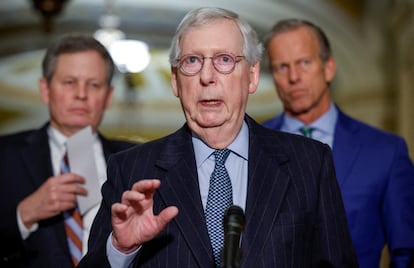Senate GOP leader McConnell briefly leaves news conference after freezing up mid-sentence
McConnell stared vacantly for around 20 seconds before his colleagues in Republican leadership, who were standing behind him, grabbed his elbows and asked if he wanted to go back to his office

Senate Republican Leader Mitch McConnell briefly left his own press conference Wednesday after stopping his remarks mid-sentence and staring off into space for several seconds.
McConnell approached the podium for his weekly press conference and began speaking about the annual defense bill on the floor, which he said was proceeding with “good bipartisan cooperation.” But he then appeared to lose his train of thought, trailing off with a drawn-out “uh.”
The Kentucky senator then appeared to freeze up and stared vacantly for around 20 seconds before his colleagues in Republican leadership, who were standing behind him and could not see his face, grabbed his elbows and asked if he wanted to go back to his office.
He did not answer, but slowly walked back to his office with an aide and Wyoming Sen. John Barrasso, a former orthopedic surgeon who is the No. 3 Republican in the Senate. After sitting down in his office for several minutes, McConnell later returned to the press conference and answered questions from the press.
Asked about what happened, McConnell said he was “fine.” Asked if he is still able to do his job, he said, “Yeah.”
A McConnell aide said he felt lightheaded and stepped away for a moment. The aide requested anonymity to speak about the senator’s health.
McConnell, 81, was out of the Senate for almost six weeks earlier this year after falling and hitting his head. His office later said he suffered a concussion and fractured a rib. His speech has recently sounded more halting, prompting questions among some of his colleagues about his health.
After the press conference, Barrasso told reporters he “wanted to make sure everything was fine” and walked McConnell down the hall to his office.
Barrasso said he has been concerned since McConnell was injured earlier this year, “and I continue to be concerned.”
But asked about his particular concerns, Barrasso said: “I said I was concerned when he fell and hit his head a number of months ago and was hospitalized. And I think he’s made a remarkable recovery, he’s doing a great job leading our conference and was able to answer every question the press asked him today.”
McConnell was reelected easily to another term to lead the conference last year, despite a challenge from Florida Sen. Rick Scott. But several Republicans, including No. 2 Republican Sen. John Thune of South Dakota and Barrasso, are seen as waiting in the wings to someday replace McConnell as leader.
Texas Sen. John Cornyn, who is also seen as a potential candidate to succeed McConnell, told reporters after the episode, “I support Senator McConnell as long as he wants to serve as leader.”
McConnell’s fall in March was the second major injury for McConnell in recent years. Four years ago he tripped and fell at his home in Kentucky, causing a shoulder fracture that required surgery. McConnell had polio in his early childhood and he has long acknowledged some difficulty as an adult in climbing stairs.
First elected to the Senate in 1984, McConnell became the longest-serving Senate party leader in history in January.
The Republican leader is one of several senators who have been absent due to health issues this year. Democratic Sen. Dianne Feinstein of California, 90, was out of the Senate for more than two months after suffering from a bout of shingles. And Sen. John Fetterman, D-Pa., 53, took a weekslong leave to get treatment for clinical depression.
Sign up for our weekly newsletter to get more English-language news coverage from EL PAÍS USA Edition
Tu suscripción se está usando en otro dispositivo
¿Quieres añadir otro usuario a tu suscripción?
Si continúas leyendo en este dispositivo, no se podrá leer en el otro.
FlechaTu suscripción se está usando en otro dispositivo y solo puedes acceder a EL PAÍS desde un dispositivo a la vez.
Si quieres compartir tu cuenta, cambia tu suscripción a la modalidad Premium, así podrás añadir otro usuario. Cada uno accederá con su propia cuenta de email, lo que os permitirá personalizar vuestra experiencia en EL PAÍS.
¿Tienes una suscripción de empresa? Accede aquí para contratar más cuentas.
En el caso de no saber quién está usando tu cuenta, te recomendamos cambiar tu contraseña aquí.
Si decides continuar compartiendo tu cuenta, este mensaje se mostrará en tu dispositivo y en el de la otra persona que está usando tu cuenta de forma indefinida, afectando a tu experiencia de lectura. Puedes consultar aquí los términos y condiciones de la suscripción digital.








































